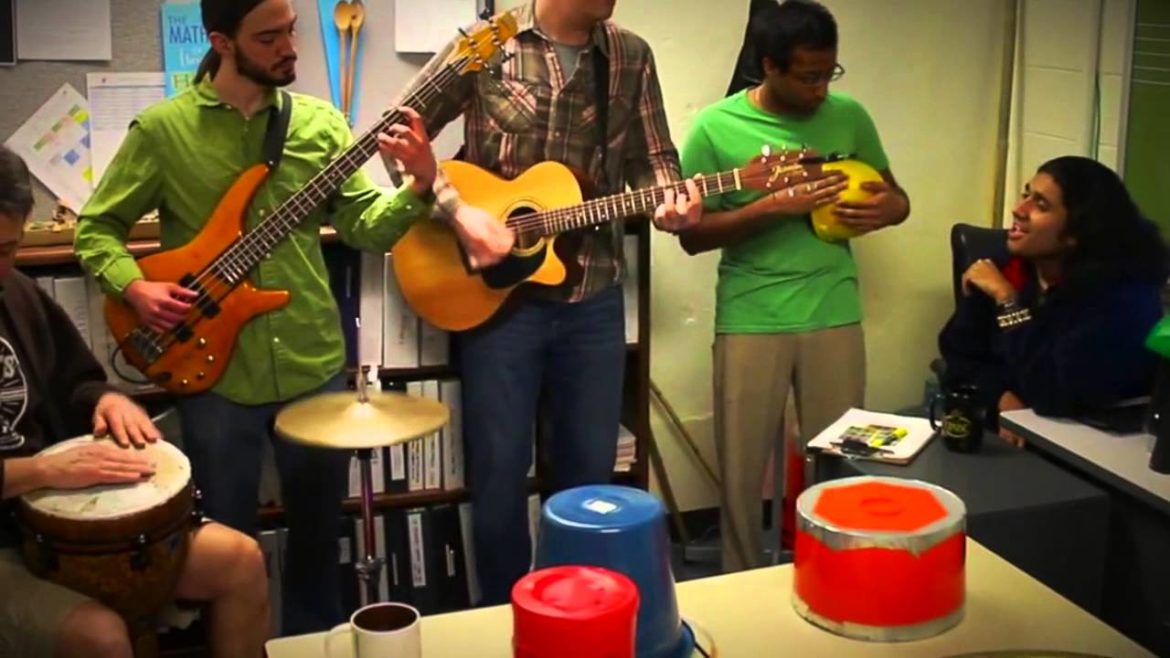Straight Up Tribal doesn’t practice. Their songs don’t have set lyrics. And the band was formed from a drum circle at the University of Maryland – Baltimore County that eventually took on a life of its own. It’s all very on-brand for a group that describes itself with terms like “grassroots rhythm” and “revolutionary tunes.”
“We played around with the title ‘world funk,’ but I like to think we’re even more open than that,” said 32-year-old frontman Abhik Saha. “It’s like an improvisational funk/rock/reggae sound with a little bit of an operatic flair.”
Like three quarters of the band’s current lineup, Saha joined Straight Up Tribal before the group had a formal name. At first, it was just a drum circle founded by Steven McAlpine, a UMBC instructor who joined the faculty in 2006.
McAlpine, 57, had played percussion since third grade and wanted to foster an “out-of-classroom” space, he said. And he was interested in the communality of drumming, as well as its flexibility. Years ago, he auditioned for Stomp, a performance group that uses ordinary objects to create percussive beats. In 2000, he attended the Rocky Mountain Folks Festival and was invited to perform onstage with his friend, Paul Reisler, on the hammer dulcimer. McAlpine didn’t have his drum kit, but he improvised by foraging for a five-gallon water drum and bringing it onstage.
“That’s the moment I realized these everyday objects can be viable musical instruments,” he said. For his drum circle at UMBC, he brought along extra djembes — a traditional African drum — and invited all sorts of performers to join in: bucket drummers, singers, even dancers and hula-hoopers.
Trey Kulp, the band’s guitarist, was one of the first UMBC students to join the drum circle when McAlpine set up outside the school’s University Center. But the impromptu performances gained more of a structure when Saha joined the drum circle and began singing over the beats, improvising the words every time he joined in.
“I had no idea Abhik was such a talented improviser,” McAlpine said. Saha, for his part, said his parents were classically trained as Indian musicians, a tradition that incorporates a wide degree of extemporaneous performance.
“So, I grew up with my parents singing and making music,” Saha said. “For me, I would say that it has a lot to do with meditation and mindfulness. In the sense that I believe we’re all capable of making up incredible things on the spot, we just have to get out of our own way and allow it to come out of us.”
Kulp even credits Saha with coming up with the name for the band.
“It kind of came out of a joke because Abhik would start yelling out ‘Straight up tribal!’ in between songs,” Kulp said. “And I was like, ‘Dude, that’s our name.’”
Straight Up Tribal solidified in 2010 when Stephen Mitchell — Kulp’s friend and former classmate at Gov. Thomas Johnson High School in Frederick — joined the band as a bass player. For four years, the group had a regular monthly gig at Teavolve, a café and lounge in Baltimore. They’ve also performed in Frederick, on First Saturdays in front of the Velvet Lounge, and at several previous Alive @ 5 concerts.
For McAlpine, though, the group’s most meaningful performances have been at events that reflect their own values and beliefs. In 2011, the band performed at the Occupy D.C. demonstration in McPherson Square. And in 2015, Straight Up Tribal performed at Artscape in Baltimore as part of an exhibit made entirely out of recycled plastic and discarded materials. McAlpine crafted two drum tables and a kit made entirely from found objects for the performance — and still uses the recycled kit for 95 percent of the band’s performances.
“The band really exists to raise awareness, so it’s thinking about where we want to perform,” he said. “It’s not about the money. It’s about connecting with people and co-creating the world we want to live in.”
The band also still relies on improvisation. According to Kulp, most of their songs have a few set chord progressions and an overall theme, but the rhythm and lyrics still change from performance to performance.
“I think it brings a rawness to the shows,” he added. “The moment is special because it’s different every time.”

